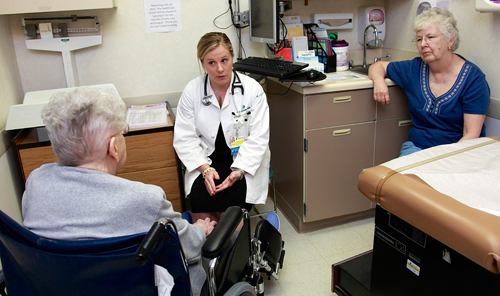With $28.3 million in funding, Christiana Care and partners focus on clinical and translational research


Christiana Care Health System is the data center and a community-based research site in a multi-center, $20 million grant from the National Institutes of Health to support the growth of clinical and translational research.
The five-year grant will support initiatives that bring research discoveries into clinical practice to meet community health needs and address health disparities. The state of Delaware will provide an additional $5 million for the program, called Delaware CTR-ACCEL, along with $3.3 million in matching funds from the participating institutions: Christiana Care, Nemours/A.I. duPont Hospital for Children, the Medical University of South Carolina and the University of Delaware, which will lead the program.
“Christiana Care brings leadership in epidemiology, biostatistics and study design,” said William S. Weintraub, M.D., the John H. Ammon Chair of Cardiology at Christiana Care and director of the Christiana Care Center for Outcomes Research.
Part of Christiana Care’s Value Institute, the Center for Outcomes Research will manage the biostatistical and epidemiological components of the CTR program.
“As the largest provider of health care in the state, Christiana Care also brings to the program access to our patients and the intellectual capital of the many people who work here,” Dr. Weintraub said.
The executive committee of Delaware’s CTR-ACCEL is comprised of Weintraub; Thomas Buchanan, Ph.D., director of the Delaware Rehabilitation Institute; Julia Barthold, M.D., associate chief of urology at Nemours/Alfred I. duPont Hospital for Children; Steven Kautz, Ph.D., professor and chair of health sciences at the Medical University of South Carolina; and Stuart Binder-Macleod, Ph.D., associate vice provost for clinical and translational research at UD, who will serve as principal investigator.
“This important grant is instrumental in the further development of clinical and translational research in Delaware and in South Carolina, and will strengthen our research programs so we can improve bench-to-bedside treatments,” said Weintraub. “It also will support the research infrastructure we need for the population health research we do at Christiana Care’s Value Institute.”
Among the health priorities of the CTR grant are cancer, cardiovascular disease, obesity and infant mortality. The program includes a number of key components to support infrastructure growth, including pilot grants, mentoring, education and career development, clinical research design, recruitment of mid-career professionals and community engagement.
Michael Rosenthal, M.D., chair of the Department of Family and Community Medicine at Christiana Care, will serve as the CTR project leader for community engagement and outreach.
“Translational research is about how to take research findings and apply them to real-life situations in practices and communities, so community engagement is a very important component of this project,” Rosenthal said. “Many members of our practices, our providers and community members can work with us to develop research initiatives and important projects, and can help create new evidence so patients can derive the most benefit from research in health care.”
NIH awarded the CTR grant to Christiana Care and its partner institutions via the IDeA (Institutional Development Award) program, which builds research capacity in smaller states such as Delaware by supporting basic, clinical and translational research, faculty development and infrastructure improvements.